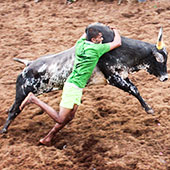Madurai, formally known as Madura, is the third-largest city in the Indian state of Tamil Nadu. The city that rests on the river Vaigai banks is also among the oldest continuously inhabited cities in the world. The city is well known for its rich heritage and Tamil language promotion through "Sangams" for ages. The Meenakshi Amman temple situated in the heart of the city is famous, and there are a number of temples in and around the city. Hence the city is often called the City of Temples (Koil Maanagar). Madurai is famous for an annual celebration named Chithrai Festival, taking place during mid-April–May. Millions gather in the city to attend this carnival that lasts for almost one month, making it the world's most extended celebration. Jallikattu is another highlight that Madurai is known for, and it coincides with the Pongal festival in January.
The term Jallikattu is made up of two elements, Jalli and Kattu. Here Jalli is known as ‘Salli’ or ‘Kasu’ in Tamil means coins, and Kattu stands for bundle or pouch. This together signals a yellow pouch of coins tied to the bull’s horn during the event. Jallikattu is a taming sport held in Tamil Nadu as part of festival celebrations on Mattu Pongal day, regionally known as Eru Thazhuvudhal or Maniu Virattu means ‘hugging the bull’. This event has been in traditional practice since 400-100 B.C. Tracing back to its history, the sport was common among the ancient Aayars from the Mullai region and Yadava (Mayor) community. Later, it turned into a platform for the display of bravery, and prize money was introduced for fueling participation. The ceremony was also used as a traditional way of finding a physically powerful groom. The person who successfully tames the bull would win the maiden. History marks that Jallikattu was prevalent in the country since Indus Valley Civilization as a stone seal found at Mohenjodaro has this sport engraved on it. This 4000-year-old seal can now be found at the National Museum in New Delhi. A 1500-year-old cave painting discovered near Madurai beautifully finished in white kaolin also depicts a man trying to control a bull.
This sport is played during Pongal as a way to include Lord Muniswara. According to mythology, once Lord Shiva asked Basava, his bull, to convey a message to Earth's people asking them to take an oil bath every day and have food once a month for six months. However, Basava confused the two messages and eventually asked people to eat every day and take an oil bath once a month. Knowing this, the furious Lord Shiva cursed Basava to turn a domestic animal for humans and help plough their fields. People who believe in this legend worship and try to tame cattle stock in Jallikattu event. From years, this ritual is practiced; hence Bulls are bred by households especially farmers, specifically for the event. The bulls are often taken for swims to strengthen their legs, muds are applied to their horns, and various other measures are taken to make the bull strong, healthy, and look good. Before the event commences, the bulls are taken to the local temple or any worship center to seek blessings before they are released in the event. This has turned into a profession for many in the villages, undertaking bull training and practicing taming from generations. The embracer is believed to polish his skills and learn new tricks with each year of participation.
With these centuries of Practice and Celebration, the sport has become an intrinsic part of the Tamil culture, breaking all religious and caste barriers. The sport is usually held once a year in villages to celebrate mainly local temples and church festivals. Christian churches organized about 30% of the events held during 2013. The sport which is played on the third day of Pongal (festival in Tamil Nadu) has a natively reared bull being left free in an arena. Groups of people enter this arena and have to try and tame the bull with bare hands. The participants try to do this by holding the bull’s hump. There are two kinds of bull in the event one is called Suthumadu on which the player shall stick to the hump tightly until the bull rotates thrice, and the other is Pokumadu on which the player shall hang until it reaches the endpoint.









